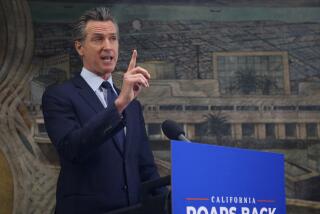Freedom’s Not Always Good : State lottery agency is too unrestricted, and that should change
Since its inception in 1984, the California Lottery has operated under rules that, compared with those imposed on other state agencies, give it extraordinary fiscal freedom. But costly missteps--including a fiasco in which millions were lost because of a canceled computer contract--have led some state officials to conclude that greater oversight is needed. High time.
In a way the lottery invited trouble from the start. It was created through a lottery-industry-backed initiative and was sold to voters as a government apparatus that would be businesslike and free from political interference. It is a state agency, with more than 900 employees. But in a rare arrangement, lottery officials do not have to submit a budget to the governor and the Legis- lature. The enabling legislation set up a five-member oversight commission appointed by the governor. As a watchdog this panel has fallen short.
California schools receive 34% of lottery proceeds. The rest of the money goes to prizes, 50%, and administrative expenses, 16%. If the amount spent on administration--which includes game costs and operating expenses--dips below 16%, the schools get extra money. With costs near that percentage this year, the schools stand to get less, according to the state legislative analyst.
Lottery officials insist that the current formula “ensures there is maximum value for every dollar spent.” But, the state legislative analyst says, California schools have lost heavily under the arrangement. In 1992, for example, lottery officials awarded High Integrity Systems Inc. a $150-million contract to increase the number of ticket outlets and make it easier for lottery players to cash in winning tickets. The next year the lottery administrators canceled the contract, charging “nonperformance.” Two years later the lottery settled with the vendor in a deal that allows the company to continue as the operator. But the agency must pay more for the same job, and it has already lost millions in school funds it would have had if the original improvements had gone through on schedule.
It appears that the lottery commission failed to do a proper job of oversight, particularly regarding fiscal discipline by the lottery operator. Assemblywoman Debra Bowen (D-Marina Del Rey) has introduced a bill that could help. AB 2157 would bring the lottery budget under legislative review and require the agency to follow the same tested state procurement procedures as other state agencies. Another provision in the legislation, to lower the cap on administrative expenses from 16% to 10% and give the difference to the schools, is more problematic. Most state lotteries spend 15% to 18% for administration. To lower the cap to 10% might deny the operators the flexibility they need to produce more income.
To Take Action: Send a postcard with your comment to Assemblywoman Debra Bowen, Room 2158, Sacramento CA 95814 or E-mail bowen@assembly.ca.gov
(BEGIN TEXT OF INFOBOX / INFOGRAPHIC)
State Lottery Costs
Rise and fall of administration costs of the California lottery; in millions of dollars
More to Read
Sign up for Essential California
The most important California stories and recommendations in your inbox every morning.
You may occasionally receive promotional content from the Los Angeles Times.









